
*
Mandy Patinkin first shared a Broadway stage with Patti LuPone in 1979 in Evita. His portrayal of Che, the narrator, won a Tony Award, as did hers of Eva Peron. In recent years, they have performed together across the country, as well as in Canada, Australia and New Zealand, and they have just arrived at the Ethel Barrymore Theatre in An Evening With Patti LuPone and Mandy Patinkin, pairing them on Broadway for the first time in 32 years.
Patinkin (born Mandel Bruce Patinkin), who will turn 59 on Nov. 30, has long been a study in intensity and talent. He was nominated for a Tony Award for his brilliant performance as Georges Seurat in Sunday in the Park With George in 1984, as well as for his role in The Wild Party in 2000. He has released several popular CDs, including specialties in Stephen Sondheim and Yiddish music, and has toured the country and appeared on Broadway with his one-man concerts. He also appeared onstage in London last year as the shah's eunuch in the musical Paradise Found, directed by Harold Prince and Susan Stroman, and this year at the Public Theater in Rinne Groff's fact-inspired play Compulsion.
His movie career has included "Alien Nation," "Yentl" and "The Princess Bride" (as Inigo Montoya, perhaps his best-known film role). And he has had a successful if controversial (or perhaps intensely controversial) TV career, starring in the series "Chicago Hope," "Dead Like Me" and "Criminal Minds."
The controversy came from the fact that he departed suddenly from two of those shows, "Chicago Hope" and "Criminal Minds." Now he is back in a TV series, at the same time he is on Broadway, appearing as CIA veteran Saul Berenson opposite Claire Danes in the Showtime spy thriller "Homeland." In An Evening With Patti LuPone and Mandy Patinkin, the two of you could have simply alternated greatest hits. There are a couple of those, but instead you're offering a concert in which the music and the lyrics tell a story, and in which there are many duets — including songs from South Pacific, the famous "bench scene" from Carousel (with the great "If I Loved You") and selections from Merrily We Roll Along. There's also dialogue from the shows that help put the songs in context. What led you to choose to set up the concert that way?
Mandy Patinkin: Originally, about nine years ago, we were asked to open the Eisemann Center in Richardson, Texas. It was a new theatre complex, like their version of Lincoln Center. And they had called our individual bookers. They called my bookers and said they had Patti, and Patti's bookers and said they had me, and wanted us to each do 20-30 minutes of our own stuff and sing one song together, like "Getting to Know You," and say, "Goodnight, Gracie."
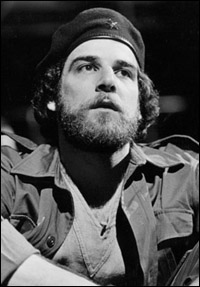 |
||
| Patinkin in Evita. |
||
| photo by Martha Swope |
Patti was doing Noises Off at the time, and I went over to see her and went backstage and I told her about this, and she said, "Yeah." I told her about my idea and she said, "Go ahead, doll." And Paul and I took her entire repertoire, from every show she's ever done and all of her concert material, and all of mine, a total of probably over 30 hours of material. And after we did that we looked at the endless ocean of material, the reservoir of material that exists, and decided what we best needed to tell the story we want to tell. So some things we've done in the past, but other things we've learned just for this.
You and Patti LuPone show a great fondness onstage for each other — as you did in your New York Times interview a couple of weeks ago. Please tell me about that fondness — and does it go all the way back to Evita?
MP: Indeed it does. It's from 1979. April that year was when we began rehearsing. We needed each other desperately. We were kids. We were scared. We were in L.A. at the Dorothy Chandler Pavilion and we opened that dressing room door and looked in each other's eyes and we grabbed each other and we never let go. And we've been friends ever since.
We've been at each other's weddings and other events in our lives, but until Texas we hadn't had occasion to work together. Except for a benefit we did for the Second Stage Theater years ago where we did the "Waltz for Eva and Che." I played Eva and she played Che; she had the beard and I had her dress on and it was pretty hilarious. We'd always seen each other's work over the years, and then this opportunity came. So I'm so grateful to this guy from Richardson, Texas, who came up with the idea and allowed me to turn it into what I really wanted — an opportunity to create something for us to be together forever, onstage.
Why after traveling around the country for several years performing together did you decide that now's the time to take the show to Broadway?
MP: We'd done it almost everywhere but New York, and our producer Staci Levine said, "Do you want to do it in New York? And our calendars were agreeable. And it just fell into place, like overnight. So we just said, "Go."
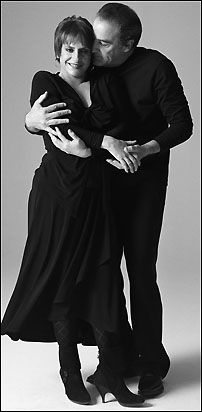 |
||
| Patti LuPone and Mandy Patinkin |
||
| photo by Brigitte Lacombe |
MP: It had nothing to do with the individual artists who created the songs, in terms of our choice. I mean, God knows, I have an affinity to both of them. But the choice had to do with the lyric and the story we were trying to tell. We were looking for songs that introduced people, that had people saying hello to each other, how are you, what do you want to do with your life, do you want to try to get married, how do you stay together, what about a family, what do we do for fun, how do we entertain ourselves, and what happens after this life — where do we go? And what happens when we get old, and what happens when we're somewhere else? What are the songs and the lyrics that are about those questions? And Paul Ford, who's like the Library of Congress when it comes to the world of musical theatre, always finds an endless array of choices for any topic we want to sing about. That, coupled with Patti's input and my input and anyone else's we talk to — friends, advisors — we end up finding the words that express the journey we want to be flying on.
You and Patti do several song medleys, for instance a group of songs from Sondheim's Merrily We Roll Along, and it seems that sometimes the songs aren't complete. What drove that decision?
MP: Most of them are complete songs. We try not to do little snippets. We try to do the whole piece whenever possible. There are certain moments when we just do a little piece of something because the point is made that we're interested in making in the story, and we don't need more, so we're ready to "move on" — as Steve Sondheim and James Lapine often say.
Of course, there are songs from Evita — "Oh What a Circus" and "Don't Cry for Me Argentina." How does it feel performing those songs 32 years later? What memories do they bring back?
MP: I sit there in that chair and I watch her sing it and I feel like I'm absolutely back in time. I feel like it's a time machine, that I'm 32-33 years younger. I watch her artistry, I watch her beauty, and I pinch myself that this is happening — that I have this privilege to be here at this moment listening to this again in my life. And I can't get over it. And I try to really pay attention — and it's not a hard thing to do. I really pay attention, and I never take it for granted.
One thing you're known for is singing Yiddish songs. Why isn't there one in the concert?
MP: Well, we might throw it in as an encore on a given night here or there. There's not a good reason that there's no Yiddish song in the concert. We're actually working for ideas for "Patti-Mandy Version 2," and I'd be more than happy to take that question as a suggestion and let it go from there.
How come nothing from Sunday in the Park With George — no "Finishing the Hat," or "Move On"?
MP:We actually did do several numbers — I think at one point we were doing "Move On" together, when we did it in Richardson. And for various reasons, we replaced it with other material because of the way we wanted to tell the story. We love it, and we probably will do it at times in the future, but it just didn't work for the story we were trying to tell for this particular evening. Paul Ford, a great musician, is your pianist — with John Beal on bass — but there's no orchestra. Why did you choose not to have more musicians on Broadway?
MP: When I first started out doing my solo concerts, about 1989, we experimented with orchestra performances. And I did a few, but I fell in love with what we did in our rehearsal studio, with just Paul and me. With the nakedness of it, and the simplicity of it, and the focus that it demanded on the material — i.e. the lyrics, the words. Because if you put that much humanity [of an orchestra] onstage, it's unavoidable, you have to pay attention to it. It changes the energy level.
With a bare stage, with just two singers and a bass player and a piano player, it's so simple that it helps you just focus on the words that these great geniuses wrote for all of us to listen to forever. And Patti and I get to be the mailman and the mailwoman.
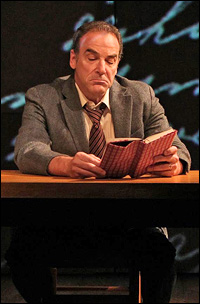 |
||
| Patinkin in Compulsion. |
||
| photo by Joan Marcus |
MP: I was doing Compulsion for a year and a half, at the Yale Repertory Theatre, and Berkeley Rep and the Public Theater in New York. And right before we opened at the Public, [TV producers and writers] Alex Gansa and Howard Gordon contacted me about playing this part in the Showtime series "Homeland," and I read their script and I thought it was fantastic and had the clear potential of being everything that we're getting to enjoy. I talked to Oskar Eustis [artistic director of the Public Theater], and everybody bent over backward — my agents, my lawyers, the people from Fox TV — to make all the scheduling work. I kept flying back and forth after every scene in the TV pilot to go to technical rehearsals at the Public. And we finished the pilot, and it was one of the best experiences of my life.
It's 12 episodes a year, which for the actors is five and a half months a year, which leaves me the other six and a half months a year to have my concert career, which I can't live without. I need that music to feel alive. Not just the music to feel alive. I need to hear those words. I need to be with those words. I need to be with Patti, I need to be up there with my son Gideon, who performs with me sometimes. I need to be up there with Nathan Gunn. Or Taylor Mac, who I'm working with on a new show. I need to be there with Paul Ford. It is absolutely my lifeblood. And with Patti LuPone most of all.
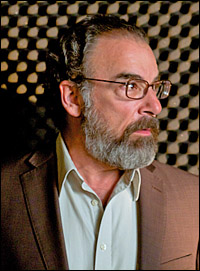 |
||
| Patinkin in "Homeland." |
||
| photo by Kent Smith/SHOWTIME |
MP: It's very interesting as an actor. You have to work so much harder when the writing is not up to speed, when it's not as good as you hope it would be. But in the case of "Homeland," the writing is so spectacular that it requires almost the least effort from me that I have ever had to expend as an actor, because they have done so much of it for me. I have a personal litmus test. When the material is very difficult to learn, and I have to go over and over and over it, and it doesn't get into my head, that's exhausting. And this material, that these writers compose for the "Homeland" scripts, it just flows right into my brain. It's the most effortless experience I've ever had in learning lines. And that to me says it all. Because it all makes such perfect sense.
They also say to me, "Do you want to know what happens, ahead of time?" And I say no, I don't want to know — just as I wouldn't know in real life. I can't wait for the next script, to turn the page and see what happens next.
That said, the way I work, I still fill it, underneath the words, with an awful lot of things that I connect to. The key word in my life is connect — to connect. And that's a word that I got from James Lapine and Steve Sondheim, from Sunday in the Park With George, where George kept saying, "Connect, George, connect." So I'm always looking for those connections. And the material is so rich, so present — it's so immediate to our lives at this moment, that there is absolutely no shortage of connection. This is one of those moments in life where I really am trying to pinch myself, to just go like, let the sun set an hour later every day, I just don't want the days to go too fast, it's just such a wonderful time. And when you get to be 58 — I'm going to be 59 on Nov. 30 — you know that those times don't come every day, so you're a fool if you don't cherish and save them.
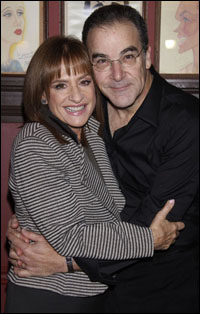 |
||
| Patti LuPone and Mandy Patinkin |
||
| photo by Joseph Marzullo/WENN |
MP: I'd take it on in a heartbeat. Put my phone number in the article. What I'm working on right now is an original piece I'm creating with Paul Ford and [performance artist and playwright] Taylor Mac, a song cycle called The Last Two People on Earth. I call it The Mac and Mandy Show. And I'm working on another original piece of my own called Let Go that I'm going to give birth to in February. I have a week's engagement in Florida [at the Aventura Arts & Cultural Center] where I'm going to put in on the boards and start working out the kinks, although I've really been working on it a long time. It's sort of a musical photograph of a generic family — both of any generic family and the family of our country at the same time. It's a song cycle of 110 minutes. But in terms of a book musical, a new show, I'd love it. And please encourage people to get in touch with me.
If it were a revival, is there a show and role you'd be interested in doing?
MP: I wanted to do Zorba. [Producer] Barry Weissler had been talking to me about Zorba. And I have some very exciting ideas that I shared with him and I don't know whether my ideas scared him off or not, but I would love to try a workshop production, or some version of it, because it's a piece that I love, and I'm hoping that someone will have the courage to find the economic apparatus to give me a shot at seeing what my ideas look like.
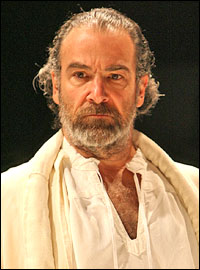 |
||
| Patinkin in The Tempest. |
||
| photo by Joan Marcus |
MP: I'd love to do more Shakespeare. As many — I want to do King Lear, I want to Much Ado About Nothing. I want to do every Shakespeare play I can get my hands on. It's just a matter of scheduling and time.
You've mentioned in the past that Joseph Papp, your mentor, once told you that "you will always need to do both the music and the classics." Any classics other than Shakespeare?
MP: I've been talking with Gordon Edelstein [artistic director of the Long Wharf Theatre in New Haven, Connecticut]. He wants me to do a production of Death of a Salesman. I looked at it when I was shooting "Homeland" and I read it a few times and I love it very much. And I'm going to try to start that process, over a period of time. Start with some readings, maybe do a production of it somewhere.
You're turning 59 soon. Are there any personal or professional goals unattained? Is there anything else, in TV or films, or the stage, you'd like to do that you haven't done?
MP: Everything. Everything that I don't know about, everything that I can't articulate. I've had a glorious life. I've had more than I ever dreamed of. But I didn't know that that would happen, and I have no idea what the future holds. I have no idea what's around the corner. And it really makes me excited, and makes me long to wake up every morning, to see what the day will bring. Merv Rothstein's work is often seen in the pages of Playbill magazine and Playbill.com. He pens the monthly A Life in the Theatre feature.
Playbill Talks to Patti LuPone and Mandy Patinkin, Two of a Kind:









